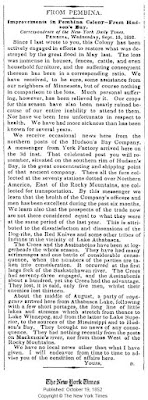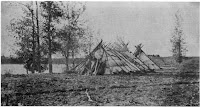
If it wasn't the weather, it was disease. If it wasn't disease, it was disagreements with the locals. In the early days of the European and Eastern American settlement attempts in our area, there was no shortage of problems...
During the first years of settlement the nearest market was St. Vincent, Minnesota. This place is situated opposite Pembina on the east bank of the Red river, about fifty-five miles from Gardar. To haul their wheat this distance, over roads that were bad, was not only a slow but a dangerous process; robberies not infrequently took place.
From Collection of the State Historical Society of North Dakota, Vol. I, for year ending June 30, 1906.
In 1793, the North West Company’s Peter Grant built the first Ojibwa-Red River trading post below the forty-ninth parallel, locating it opposite the mouth of the Pembina River at the site of today’s St. Vincent, Minnesota. Within a few years, Grant fled to Canada to escape Lakota hostility. In 1797, Nor’Wester Charles Jean Baptist Chaboillez established Fort Paubna immediately below the mouth of the Pembina River, then deserted it two years later because of the Lakota. In the fall of 1800, Alexander Henry the Younger became the latest North West Company trader to attempt maintaining a presence among the Ojibwas. The Park River Post – his first fort in the region – lasted from September 1800 until spring 1801, when it was replaced by a new fort at the mouth of the Pembina River. Although he held on longer than his predecessors, in the end Henry too abandoned the effort because of Lakota attacks.
From Rotting Face: Smallpox and the American Indian, Smallpox and the Fur Trade After the Revolution, by R. G. Robertson





































